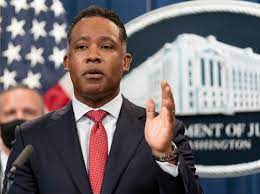DOJ Outlines Aggressive White Collar Enforcement Measures and New Compliance Expectations (Part I of II)

The Justice Department continues to push on white collar corporate enforcement, and the intersection of national security sanctions and export controls with corporate criminal enforcement. Last week, Lisa Monaco, DOJ’s Deputy Attorney General, and Kenneth Polite, Assistant Attorney General of DOJ’s Criminal Division, delivered one-two punches in separate speeches at the ABA White Collar Conference in Miami, Florida. In their speeches, DOJ announced new enforcement initiatives, as well as follow up to their compliance requirements relating to corporate compliance compensation systems and preservation of messaging data.
As an initial matter, DOJ continues to emphasize the importance of corporate culture and maintenance of a culture of ethics and compliance. DAG Monaco emphasized that “[our] goal is to empower companies to do the right thing, by investing in compliance, in culture and in good corporate citizenship.” She stated that DOJ is seeking to find the right incentives to promote and support a culture of corporate compliance.
DAG Monaco reiterated DOJ’s message encouraging companies to voluntarily disclose any misconduct that it discovers. As she noted, “the pathway to the best resolution will involve prompt voluntary disclosure to the Department of Justice.”
DAG Monaco cited the resolution of ABB’s FCPA case last year in which ABB was awarded a DPA with the parent company despite its status as a three-time recidivist. ABB earned this extraordinary result because of its extensive cooperation, its compliance program overhaul and engaging in extensive remediation.

National Security Division Elevation of Corporate Crime
Given the geopolitical environment, DAG Monaco noted that the overlap between corporate crime and national security is increasing. To meet this development, DOJ is re-tooling its priorities to increase corporate prosecutions for national security-related crimes, including cybercrime and crypto-currency criminal activity.
DOJ is appointing its first-ever chief counsel for corporate enforcement in the National Security Division. To execute this new approach, the National Security Division will add more than 25 prosecutors to focus on sanctions and export control violations.
As examples, DAG Monaco cited last year’s prosecution of LaFarge as the first-ever prosecution of a company for material support of terrorism. In that case, DOJ cited evidence that executives paid millions to ISIS and other terrorist groups in exchange for permission to operate a cement plant in Syria. LaFarge paid penalties totaling $750 million.
DAG Monaco also cited specific prosecution results against cryptocurrency criminals, including the recovery of over $5 billion in cryptocurrency.

In recognition of the anniversary of Russia’s unprovoked invasion of Ukraine, DAG Monaco warned companies that sanctions and export controls risks should be at the top of every company’s risk compliance chart. . DAG Monaco revealed that DOJ is currently investigating corporations for sanctions evasions in a variety of industries, including transportation, fintech, banking, defense and agriculture.
Additional Resources for AML and Bank Integrity Unit
In a related development, DAG Monaco stated that DOJ will make a “substantial investment” in the Bank Integrity Unit in the Criminal Division’s Money Laundering and Asset Recovery Section. The BIU plays a lead role in corporate prosecutions of global financial institutions for sanctions violations.
Big Cases Coming
DAG Monaco teased that some “significant announcements in some significant cases” are coming, and that these cases implicate the trend of overlapping corporate and national security criminal cases.















